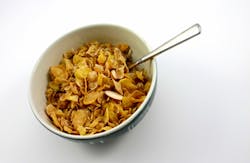Mold-related toxin found in some oat breakfast cereals
Some oat-based breakfast cereals produced for the U.S. market are contaminated with a potentially harmful toxin, according to a new study.
The researchers said that oat production, storage and processing need to be reviewed to better protect consumer health.
Hyun Jung Lee and Dojin Ryu from the School of Food Science at the University of Idaho tested almost 500 samples of corn-, rice-, wheat- and oat-based breakfast cereals purchased from U.S. stores over a period of two years. They measured levels of the mold-related toxin called ochratoxin A (OTA), which has been linked to kidney cancer in animal studies.
Previous studies have found the toxin in samples of pork, dried fruits, wine, coffee and other products, the American Chemical Society reported. Although we don't yet know how the toxin affects human health, the International Agency for Research on Cancer, which is part of the World Health Organization, classifies it as a possible human carcinogen.
The European Union has set maximum limits for OTA in food, but the United States does not currently regulate the toxin.
Lee and Ryu wanted to see how U.S. breakfast cereals compared to the E.U. standard.
They found that in most of the samples tested, OTA levels were lower than the European threshold. The incidence of OTA was highest in oat-based breakfast cereals, followed by wheat-based, corn-based and rice-based breakfast cereals.
Results showed that concentrations exceeded E.U. permitted levels in 8 percent of oat-based breakfast cereal samples, leading the scientists to conclude that oats and oat-based products may need greater attention, with further surveillance programs and development of intervention strategies to reduce health risks in consumers.
The findings have been published in the American Chemical Society's Journal of Agricultural and Food Chemistry.
